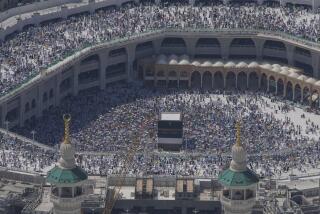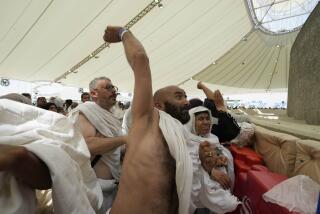Ethnic Discord : Pilgrimage of Egypt’s Copts a Test of New Mideast Peace : As Cairo drops restrictions on travel to Israel, the Christian minority is leading the way. But their journeys risk angering Islamic militants, as well as their own Pope.
- Share via
CAIRO — A thin cloud of concrete dust hangs over the reception room of the Israeli Embassy here these days. Piles of tiles, ready to be laid, are stacked in a hallway. Walls are about to be knocked down, counters replaced.
The bedlam that was the visa application section has been moved 16 floors down, to a new office posted, unbelievably, “Israeli Embassy Tourism Office.”
Unbelievable because, during decades of enmity, the conventional wisdom has been that Arabs don’t do Israel, especially not on tour buses. Even during the last 15 years of official peace between Egypt and Israel, the idea of Egyptian tourists traveling to Israel was virtually unheard of.
But now, with the signing of a peace agreement between Palestinians and Israel, the Egyptian government has quietly dropped restrictions on travel to Israel and opened the border stations at Taba and Rafah 24 hours a day. While most Egyptians still are not flocking across the frontiers, the Holy Land has become a new pilgrimage point for hundreds of Egypt’s Coptic Christians, who are paving the way toward a warmer peace between Arabs and Israelis.
“We know now that thousands of Copts have visited Jerusalem, and there are no restrictions at all from the government any longer,” said Antoine Zedhoum, publisher of the Coptic weekly newspaper, Al Watani. “When people say it is time for full relations with Israel, I say, ‘Why not? Why not?’ ”
The number of Egyptians crossing the Rafah border into Israel has climbed from its usual trickle of about 200 a month last fall, before the new policy took effect, to about 500 a month, rising to an estimated 1,000 during the Easter season this spring.
Egyptian travel agents say about 80% of their business to Israel is Coptic Christians.
In launching the first wave of Arab tourism to Israel, the Coptic community risks further angering Islamic militants, who have laid siege to the community in recent years.
The tourists are also going against the edict of the Coptic Christian patriarch, Pope Shenouda III. Urging Copts to show solidarity with their Muslim compatriots, he ordered Egyptian Christians not to visit Jerusalem until the entire issue of Israeli occupation, especially the status of Jerusalem, is resolved.
“It’s not the Pope’s business,” shrugged Tais Luka, a retired Coptic schoolteacher who made a pilgrimage to Jerusalem with a tour group this spring. “He said (not) until we take the Al Aqsa mosque (Islam’s third holiest shrine, in east Jerusalem). Well, could he guarantee that we’re going to live up until then? Why should we suffer for something that will get us nowhere, and they (the Muslims) don’t appreciate it.”
Egypt’s 5 million Copts have taken a low profile in recent years with the growth of militant Islam and an increasing trend toward Islam in the schools, in the press and even in the streets, where most women now adopt the loose dress and head covering of the Islamic hijab .
Over the last three years, a new wave of violence has targeted the Copts, particularly in the rural villages of Upper Egypt where they are the most numerous.
Groups of angry Muslim militants, in incidents deplored by Muslim officialdom, have burned churches and attacked Coptic shops, often raising shadowy allegations about Coptic plots against Muslims and labeling the Copts as “unbelievers.”
At least 150 Copts have been killed in the violence. In March, two Coptic priests and three other Christians were shot to death outside a monastery in southern Egypt.
Although the anti-Christian violence has abated in recent months as Islamic militants have focused their fury on foreign tourists and Egyptian security officials, the Coptic community nonetheless is feeling isolated in a society that increasingly has turned to conservative Islam.
Well-known Muslim clerics broadcast anti-Christian messages from the mosques. The best jobs usually go to Muslims, and few Copts are allowed to advance to the top of their faculties at Egyptian universities, particularly in medical fields.
Even the selection of Boutros Boutros-Ghali, an Egyptian Copt, as secretary general of the United Nations in 1991 did not do much to encourage Copts in the Egypt’s political community, where leaders note that no Copt has ever risen to the rank of full minister.
The Egyptian government, hoping to avoid a rise in Christian militancy, has come strongly to the Copts’ defense, publicly urging religious harmony and emphasizing the message of the equality of all Egyptians. Police guards are now posted outside every church in Egypt.
Pope Shenouda and most Coptic intellectuals have urged a low-profile response to attacks, confident that the government will move to stop the violence and fearful that a militant response from the Copts could plunge Egypt into the kind of communal misery that destroyed the social fabric of neighboring Lebanon.
“The Copts are more intelligent, more patient. Therefore, they lie low against the Islamic wave,” said prominent Coptic intellectual Milad Hanna, a former member of Parliament.
Luka, one of the first wave of Coptic pilgrims to Israel, said Egyptian Christians are visiting the holy sites in Jerusalem, Bethlehem and Nazareth in part to regain a sense of their own identity as Christians, an identity she felt herself losing in Egypt.
“You know, it really gives you a feeling that there is Christianity, after all,” she said. “Because living here, the Muslims always say Christ was just another prophet. Sometimes they even say, ‘You imagined the Crucifixion.’ Think of it! And you hear that every day, day after day, on the TV, on the radio, in the newspaper, and after a while you begin to ask, ‘Could it be so?’ ”
In response to the Pope’s ban on travel to Jerusalem, none of the touring Copts has been allowed to take Holy Communion at the Coptic church in Jerusalem.
Copts say the true reason for his ire about Israeli tourism is not the Muslims’ Al Aqsa mosque but the Copts’ own Deir al Sultan monastery in Jerusalem.
The monastery was the subject of prolonged dispute after Israel refused Egyptian requests to enforce a court order ejecting the Ethiopian Coptic church from the monastery grounds.
Rachad Antonius, a Christian sociology professor at American University of Cairo, said the wave of Coptic pilgrimages should not be overestimated.
“When they go there, they go there for purely religious reasons,” he said. “And the most important thing is they do not establish links with Israeli institutions.”
But Israel hopes that will be the next step. The Israeli Embassy has eagerly taken visa applications from all comers, Christian and Muslim, and usually grants visas to Egyptians within a week.
For Israelis, Arab tourism is not only an avenue for new economic cooperation but a chance to rehabilitate Israel’s reputation in the Arab world.
“This Egyptian who is going to Israel, for him, he is going to a place that is not even existing: The map on the border on the Egyptian side says Palestine, not Israel,” said Ronnie Porat, Israel’s consul in Egypt. “He heard that it’s a place that’s not cheap, a place that is full of soldiers all over the streets. He heard that everybody in Israel is addicted to drugs. He heard he’s going to get AIDS there. . . . The problem is that the barrier is one of knowledge, of thinking. It’s a matter of burying the stigmas.”
“The whole thing has taken time for people to get the confidence to go there,” admitted Osama Wagdi, one of the three major tour operators offering trips to Israel. “But there is a big potential. People have not been going there since the ‘60s, and they are millions. A lot of them still have a psychological fear of having an Israeli visa in their passports,” he said.
“But you have to look at it another way. In another year, two years, the situation will be very normal. Jordanians are already going to Israel; there were some Israelis in Qatar two months ago. There’s no end to it. We are talking about business now and interests between two countries. Forget about politics. We are doing business with an Israeli company, and our mutual intention is to grow.”
BACKGROUND
Copts are a native Christian minority of Egypt. They played a leading role in early Christianity, founding their movement late in the 3rd Century. Copts believe in the unity of the human and divine in Christ’s nature, which was declared a heresy in 451 when church leaders from Constantinople and Rome declared that Christ has two separate natures. After that split, Copts established an independent church with its own patriarch and clergy. In 642, Muslim Arabs conquered Egypt, and many Copts converted to Islam. Today, about 5 million Copts live in Egypt; other small Coptic communities are scattered throughout the world. Copts speak Arabic, although their language, a version of ancient Egyptian, is used in Coptic Orthodox Church services.
More to Read
Sign up for Essential California
The most important California stories and recommendations in your inbox every morning.
You may occasionally receive promotional content from the Los Angeles Times.












